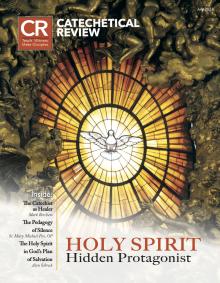As we know, the term “catechesis” derives from the Greek word katechein, which means “to echo.” Our work as catechists is to announce the Good News of Jesus Christ—to hand on to others what we have received, what we have heard, seen, and touched (1 Jn 1:1). For this reason, it might seem counterintuitive to write an article on the specific pedagogical need for silence during one’s catechetical instruction. However, the conundrum gives way when we understand the role of silence in fostering an authentic dialogue of salvation between God and the person receiving catechesis.[1] First, a personal story.
I have been a catechist for over 30 years and have taught “children” from three to 93 years of age. In my glory days as a junior high religion teacher, I had the reputation of having such a rigorous religion curriculum that my former eighth-grade students never took notes in religion class their entire freshman year of high school and still got all A’s. Many students would lovingly tease, “Sister, your quizzes are like tests; your tests are like exams; and your exams are like dissertations.” Yes, we were rigorous in our study of Catholic doctrine, but it took me many years (and a doctoral degree) to realize that I had failed to teach my students the one thing necessary: how to listen to God’s silent voice. More egregious, I had failed to let God speak.
An Education in the Faith
The various catechetical directories have consistently referred to the work of catechesis in educational terms. The 1971 Directory spoke of catechesis as “catechetical education” and the formation of the child’s heart as an “interior education.”[2] The 1997 Directory asked catechists to envision catechesis as a “school of faith” and to recognize that it serves “the simple objective of education in the faith.”[3] The 2020 Directory likewise recognizes that catechesis draws its inspiration from the “great educational work of God.”[4] We instinctively know that an education in the faith differs substantially from an education in other subjects.[5] Yet, for years, catechists have adopted a pedagogical approach that mirrors their counterpart teachers of math or science.
To be sure, the math teacher’s cycle of instruction, guided practice, student evaluation, and remedial instruction as needed has proven successful for many students seeking to master algebra. In catechesis, however, our aim is not to have students master knowledge but to have a knowledge of the Master. This is no clever play on words. The 2020 Directory exhorts catechists to “evangelize by educating and educate by evangelizing.”[6] This means that we must include in our unique educational pedagogy a way for the child to encounter the Lord—a way for her to hear God’s voice. We must provide a way for the child to contemplate—not master—God’s truth, beauty, and goodness.
The rest of this online article is available for current Guild members.
This article is from The Catechetical Review (Online Edition ISSN 2379-6324) and may be copied for catechetical purposes only. It may not be reprinted in another published work without the permission of The Catechetical Review by contacting [email protected]


















